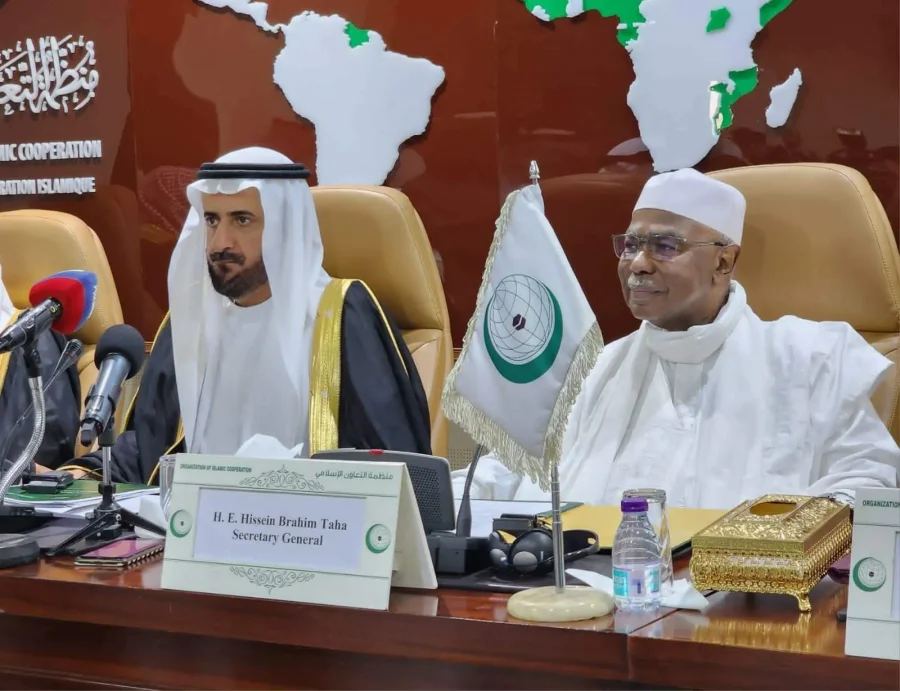Hissein Brahim Taha, Secretary-General of the Organization of Islamic Cooperation (OIC), welcomed Dr. Tawfig bin Fawzan Al-Rabiah, Minister of Hajj and Umrah in Saudi Arabia, at the General Secretariat headquarters.
During his welcoming speech, the Secretary-General expressed gratitude towards King Salman bin Abdulaziz, the Crown Prince, Prince Muhammad bin Salman, the Saudi government, the Ministry of Hajj and Umrah, and all State sectors for their commendable efforts in facilitating procedures for pilgrims and visitors of the Two Holy Mosques. He appreciated their efforts in ensuring the visitors could perform their rituals fully.
Hissein Taha said, “Saudi Arabia is honored to be entrusted with the responsibility of being the guardian of the Two Holy Mosques and serving the pilgrims of the Sacred House of God and the visitors of the Prophet’s Mosque. The country is committed to overcoming all obstacles and utilizing its resources, skills, and workforce to ensure the success of the Hajj season every year and provide a unique spiritual journey for the pilgrims while prioritizing their health and safety.”
The Minister of Hajj and Umrah met with delegates, permanent representatives, and consuls general from OIC Member States and subsidiary organs. During the meeting, he discussed Saudi Arabia’s efforts and arrangements for this year’s Hajj, including initiatives and procedures to ensure the best possible conditions for pilgrims to perform their rituals with ease and reassurance.
According to Dr. Al-Rabiah, “the OIC holds a special position as the platform for the Muslim community and advocates for issues affecting over 1.5 billion Muslims worldwide. Meanwhile, the Kingdom has served the Two Holy Mosques since its founding. This has been a longstanding priority for the Saudi government, earning praise from countries worldwide for their commitment to serving pilgrims.”
Dr. Al-Rabiah highlighted the successful collaboration of various agencies in the Hajj and Umrah ecosystem, resulting in significant achievements in health, organization, service, logistics, and security. King Salman, bin Abdulaziz Al Saud, inaugurated the Pilgrim Experience Program, a crucial component of the Saudi Vision 2030, aimed at enhancing the quality and efficiency of services and enriching the pilgrims’ experience. The expansion of the Grand Mosque in Makkah, costing over SAR 200 billion and being the largest building in history, and the construction of the Two Holy Mosques train, costing an estimated SAR 60 billion, have significantly improved the travel and transportation experience of the pilgrims and shortened the distance between Makkah and Madinah to about two hours. In addition, the development of King Abdulaziz International Airport in Jeddah, costing more than SAR 64 billion, and the preservation of historical mosques and Islamic archaeological sites aim to offer a rich religious experience to all guests of God.
The Saudi government has undertaken significant projects to serve the Hajj and Umrah ecosystem and develop the holy sites. To extend this opportunity to as many Muslims as possible, the government has implemented various initiatives and regulations that enrich the experience while reducing costs. The Minister shared that these qualitative measures are designed to facilitate Muslim’s performance of Hajj and Umrah.
Dr. Al-Rabiah announced that the Kingdom has implemented various initiatives to enhance the Hajj services and reduce the costs for pilgrims. This has significantly reduced insurance costs for Umrah performers and pilgrims by 63% and 73%, respectively, without compromising on the high-quality health services provided to them. One of these initiatives is the “Makkah Route,” which has benefited seven countries: Pakistan, Malaysia, Indonesia, Morocco, Bangladesh, Turkey, and Côte d’Ivoire. The initiative aims to minimize the waiting time for pilgrims at the airport to just 15 minutes. The relevant authorities are also considering expanding the scope of this initiative to include other countries soon.
It’s important to mention that the Kingdom of Saudi Arabia has introduced several initiatives to make it easier for Muslims to travel there. These initiatives include issuing visas in less than 24 hours, extending the Umrah visa from 30 to 90 days, introducing a four-day transit visa, and allowing visa holders to freely perform Umrah and explore the country’s unique cultural diversity. Additionally, the “Nusuk” platform was launched, which offers more than 120 services in nine languages to make the procedures for visiting Makkah and Madinah smoother and enrich the spiritual experience of pilgrims and visitors. All these efforts are part of Saudi Vision 2030.
During the event, Amb. Dya-Eddine Said Bamakhrama, Permanent Representative of the Republic of Djibouti to the OIC and Dean of the Diplomatic Corps in Saudi Arabia, spoke on behalf of the permanent representatives. He praised the Kingdom for its continuous efforts in providing services and expansions to the Two Holy Mosques, dating back to the reign of King Abdulaziz. He emphasized that the Kingdom has always ensured the safety and comfort of pilgrims, visitors, and worshipers who come to perform their rituals at the sacred sites. Bamakhrama added that the Kingdom’s generosity and dedication to this cause are undeniable.
During the meeting, a screening of the movie “The Journey of a Lifetime” took place, exploring the experience of performing the rituals of Hajj in a simple and interesting way.










